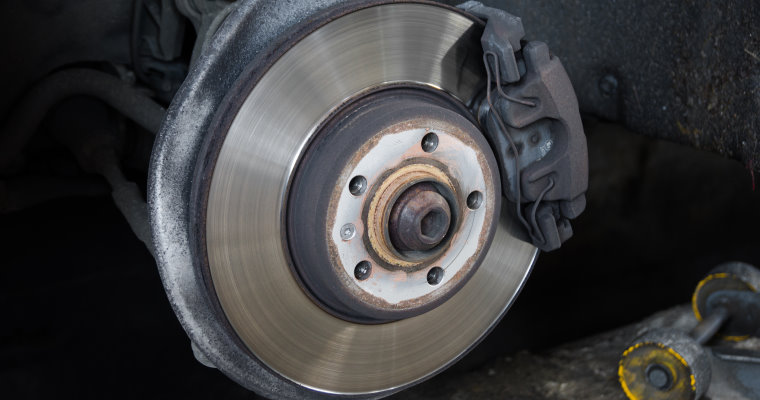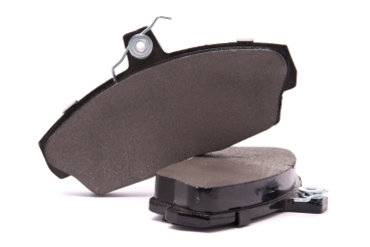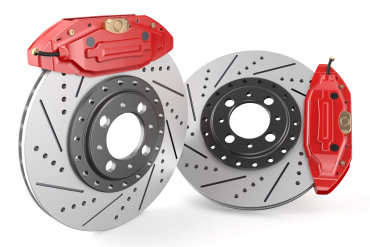Brake Pads & Brake Discs Fitted in London, Surrey, Kent & Middlesex

How Much Does it Cost to Replace Brake Pads and Discs
In the UK typically cars have brake discs mounted on all four wheels, however, it is not uncommon for them to be just placed on the front of the vehicle. All vehicles have drum brakes in the rear of the car, this is why when you replace the brake discs, they are done across all 4 wheels, in pairs.
We are often asked, 'How much will it cost to replace my brake pads?' or 'How much will it cost to replace my brake discs?' So what do new brake pads and discs cost? The answer is all brake disc prices vary dependant on the vehicle you are replacing them on. You can typically buy brake discs for around £60-90 in the UK. Naturally prices vary dependant on the quality and brand of discs. Our brake pad/disc technicians will always offer you advice and choose a suitable replacement at your request. Unfortunately these days, the more new the car is, the more expensive the discs.
If you are looking to replace just a single set of discs but to also add a single set of brake pads, therefore replacing just two wheels, you would typically need to spend on average approximately £90 to £140, again dependant on the quality and brand you decide to fit.
How do I make my brake pads and brake disc last longer?
When we replace your brake pads and/or discs our technicians will teach you have to effectively clean brake discs, this advice will ensure you reach the very maximum life possible.
Below are a few tips to 'keep you on the road'!
- Watch your speed - it obvious but driving slower means less stress on the brakes when you need them, saviour them
- Avoid having both feet on pedals - only ever use one foot
- Coast if you can - slow your vehicle rather than applying the brake. More thinking ahead can save you a small fortune
- Don't hurry stopping - pretty much the same as coasting. If you see the lights change, think ahead and you'll use the brakes less
- Remove any unnecessary items in your vehicle - keeping weight to a minimum reduces the stress on the vehicle's brakes when stopping due to there being less weight to bring the vehicle to a halt.
- Flushing your brakes every 18-24 months - the older the vehicle the more regularly this should be done. By flushing the internal components will last a lot longer and reduce your maintenance bills.

Which Brakes Are Best?
Choosing which brake pads and discs to replace your vehicle with can be a little daunting. Our technicians are here to help, not just fit! None work on commission so you can rest assured we're not here to squeeze you, we want you to return again next time! It makes good sense to look at the factory fitted brake pads and discs and consider replacing like for like. However if that does not suit your budget we have a large range of different brake pads and discs in stock we can supply and fit. We will always recommend you purchase the best you can afford as choosing poor quality brake discs and pads may wear faster than you expected.

What About Perforated & Coated Discs?
We also recommend that you consider purchasing perforated brake discs (AKA drilled discs) on your vehicles wheels. Perforated brake discs evenly distribute air via drilled holes to the disc. These drilled discs make the friction when braking less which leads to the discs not becoming so hot as non-driller discs. When airflow is higher, your vehicles brakes are far more efficient and effective.
We also supply and fit coated brake discs. The additional coating protects the disc from rusting. which have an extra coating on the discs to protect against rust, however, as with anything incorporating friction the coating does wear away with continued usage.
When Should You Change Brake Discs?
How do brake pads work?
The large steel brake disc is mounted on the inner side of the vehicle's wheel. There is a clamp to one side of the wheel's disc, this clamp holds what is called a caliper. When a driver places their foot on the brake pedal inside the vehicle pressure is applied through the brake system, which, in-turn pushes brake fluid into the brake caliper which forces the brake pads against the disc - allowing your vehicle to slow down smoothly due to it being hydraulic.
When Do I Need to Change My Brake Pads and/or Brake Disc?
The easiest way to tell if your brake discs need changing are the following:
Squealing noise:
Hear squealing coming from your wheels? Nothing to worry about, just give them a good clean. Hear very loud squealing consistently? Now is the time to replace your pads and discs ASAP! Some brake pads use a semi-metallic layer within the brake pad material or an external sensor designed to screech when the brake pad is due to be replaced. The squealing noise can be heard even when the brakes aren’t being used. If you do not resolve this immediately, you'll next hear grinding noises meaning your brake pads have worn down completely, and potentially can generate additional costs by damaging the brake disc - call us immediately.
Warning light:
Modern cars now are fitting with a warning light on the dashboard to notify you that your brake pads and/or discs need attention. You will also probably need to replace these brake pads sensors as typically expire at the same time as the vehicles pads - frustrating as it improves the cost of the overall replacement.
Car pulling to one side:
A very good sign that your brake pads or brake discs need replacing is if your car feels like it is pulling to one side whilst driving. This is not 100% reliable as this could also be the caliper guide pins or the piston is sticking.
Visual check:
Probably the most reliable method is a good look at your brake pads and discs. We strongly recommend that you check them, at least, every 10,000 miles especially so should your vehicle not be fitted with brake pads replacement sensors. You can easily check your brake pads by peering through the spokes of the car’s wheel. If your brake pads show less than 3mm it's time and they need to be replaced.
Vibrations:
If you are experiencing vibrations to your vehicle as and when you apply the brake this is a pretty tell-tale sign that your brake discs might be irregularly worn or have too much thermal damage following hard, continuous braking.
How long should brake pads last?
The short answer is brake pads typically last for 25-60,000 miles but obviously this varies with usage, the quality of the brake pads and the brand. Front brake pads normally need to be changed more often than the rear pads due to most cars being front-wheel drive, meaning the front wheels take the brunt of helping slow the vehicle.
If you drive hard, the wear on your brake pads will be hugely effected. Read the tips we have above to ensure you get the very longest usage from your replacement brake pads. Aggressive braking is what you really want to avoid and this will run them down extremely fast.
How long do brake discs last?
Predicting a life length for brake discs is different to brake pads. On average drivers typically find their discs last between 80,000 to 120,000 miles. As with brake pads, your brake discs wear comes down to your driving style and whether you are considering front or rear brake discs.
When inspecting your brake discs, be sure to look at both side of your vehicle - you need all four to be in good condition. Chances are if one has already deteriorated, the other side's brake disc will also need replacing. Lastly when changing brake discs, it makes absolute sense to also change the brake pads.

